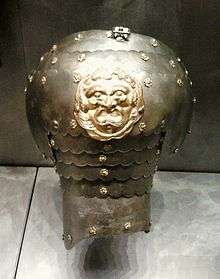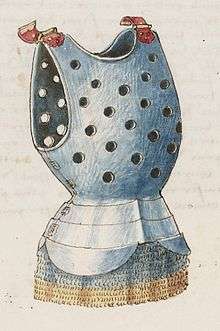Pauldron
A pauldron (sometimes spelled pouldron or powldron) is a component of plate armor that evolved from spaulders in the 15th century. As with spaulders, pauldrons cover the shoulder area.[1] Pauldrons tend to be larger than spaulders, covering the armpit, and sometimes parts of the back and chest. A pauldron typically consists of a single large dome-shaped piece to cover the shoulder (the "cop") with multiple lames attached to it, to defend the arm and upper shoulder. On some suits of armour, especially those of Italian design, the pauldrons would usually be asymmetrical, with one pauldron covering less (for mobility) and sporting a cut-away to make room for a lance rest.[2]

Jousting
The pauldron of a knight was also important in jousts. While the most points in a jousting competition were scored by unhorsing the opponent or striking the lance, points could also be scored if a lance was to hit the enemy pauldron, albeit for lesser points than a true strike.[3] Many pauldron styles made use of a lance rest to assist in the joust, allowing the knight an area to ready the lance for stronger blows. The pauldron would typically be cut shorter to allow for this rest, without restricting the arm mobility or the protection of the rider. Typically only the right pauldron would support this cut-away, as this was the lance arm of the knights contending in a joust.
Typical tournament armor for jousting would be padded with cloth to minimize injury from an opponent's lance and prevent the metal of the pauldron from scraping against the breastplate. This protective cloth padding would extend about half an inch from the rolled edge of the armor, and it was secured in place with rivets along the entire edge. In battle, this cloth protection could not be too thick, else the knight would have no arm mobility. However, in a safer tournament setting, mobility was less important compared to safety, thus leading to heavier padding. In fact, knights in this era could be padded to the point where they look "more wide than tall", as compared with contemporary depictions of jousting armor.[4]
In popular culture
Plate pauldrons tend to be found as a common armor type in many fantasy or science fiction worlds. This can be done for in-world reasons such as denoting a character's rank or culture, or merely due to aesthetic reasons by the artist. A well-known example of this is in the Star Wars universe, where colors of the pauldrons may denote a clone or stormtrooper's rank or role. An orange-colored pauldron is used to identify a stormtrooper officer, compared to the plain white of the regular forces. Additionally, a White pauldron denotes a sergeant or similar-ranked soldier.[5] The pauldron in The Mandalorian's first episode is the first upgrade made to the Mandalorian's armor in the series and a legacy of Boba Fett's original armor.[6] Another more aesthetic example would be the space marines from the Warhammer 40,000 universe, famous for their strong builds and oversized armor. These massive armor pieces it seems would be used both for deflection of enemy fire and housing important components to the exoskeleton as a whole.[7]
References
- "pouldron". Oxford English Dictionary (3rd ed.). Oxford University Press. September 2005. (Subscription or UK public library membership required.)
- Hurt, William. "Milanese right pauldron and lance rest". Age of Armour. Retrieved 25 January 2014.
- Kirstin Olsen (2017). "Jousting in England". Daily Life through History. ABC-CLIO.
- d'Anjou, Rene (1409). Traicté de la forme et devis comme on fait un tournoi.
- "What do different colors of stormtrooper pauldrons indicate?". Stack Exchange. 2015-12-29. Retrieved 2017-12-11.
- Nero, Dom (2019-11-12). "How 'The Mandalorian' Explores the Armor Made Famous By Boba Fett". Esquire. Retrieved 2019-11-13.
- "Pauldrons". Lexicanum – The Community Created Warhammer 40,000 Encyclopedia. Retrieved 2020-05-27.
